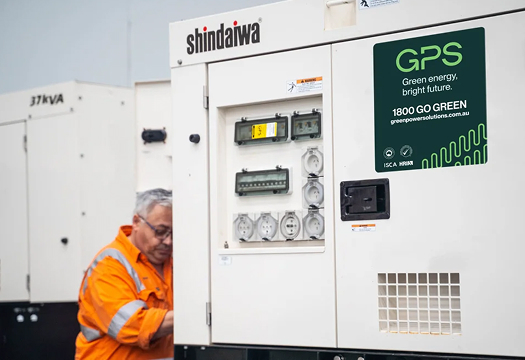Key takeaways:
Look Beyond the Sticker Price: While a traditional diesel generator typically has a lower upfront cost, a biofuel generator often proves to be the smarter long-term investment when you consider the Total Cost of Ownership (TCO). This is due to more stable fuel prices and lower maintenance expenses over the equipment’s lifespan.
Future-Proof Your Investment: Biofuel generators are already compliant with the next generation of environmental standards. This de-risks your investment against future carbon taxes, Low-Emission Zones, and other regulations that could force costly retrofits or restrict the operation of traditional diesel models.
Reduce Long-Term Maintenance Costs: High-quality biofuels burn cleaner than traditional diesel, resulting in less engine soot, reduced stress on filter systems, and potentially longer service intervals. This leads to lower operational expenses and improved reliability over time.
Align Operations with Sustainability Goals: Switching to biofuel can dramatically reduce net CO2 emissions and other harmful particulates. This provides a tangible way for your organization to meet its sustainability (ESG) goals, which can enhance your brand’s reputation with customers, investors, and talent.
What You Need to Know about Generators
In a world where consistent power is non-negotiable, a reliable generator isn’t a luxury; it’s a critical asset. For decades, the traditional diesel generator has been the undisputed champion of backup power, known for its raw power and unwavering reliability. But a new contender has entered the ring, promising a greener, more sustainable future: the biofuel generator.
The choice is no longer just about keeping the lights on. It’s a strategic decision that impacts your budget, your environmental footprint, and the long-term viability of your operations. So, when you look beyond the initial price tag, which generator is truly the smarter long-term investment?
Let’s break down the factors that matter most.
Biofuel vs Traditional Diesel
Before diving into a head-to-head comparison, it’s essential to understand the core technology and fuel behind each option.
Traditional Diesel Generators: These workhorses are the industry standard for a reason. They run on petroleum-based diesel fuel, which is readily available globally. Traditional diesel generators are celebrated for their durability, high torque output, and a vast global network of service and parts. They represent the proven, powerful, and predictable choice for many applications.
Biofuel Generators: The forward-thinking challenger, biofuel generators are engineered to run on renewable fuels like HVO (Hydrotreated Vegetable Oil) or biodiesel. These fuels are derived from sustainable sources, such as used cooking oil, animal fats, or soybeans. Biofuel generators are designed to be a “drop-in” replacement for traditional diesel, offering a significantly lower carbon footprint without sacrificing performance or reliability. For more details on our compatible models, see our [Link to Biofuel Generator Products] page.
A Head-to-Head Comparison
A smart investment is measured over its entire lifecycle, not just the day you buy it. Here’s how these two generator types stack up across key financial and operational metrics.
1. Upfront Cost & Acquisition
Traditional Diesel: Generally, traditional diesel generators have a lower initial purchase price. The technology is mature, and the manufacturing scale is enormous, which helps keep acquisition costs down.
Biofuel: Biofuel-compatible generators can sometimes have a slightly higher upfront cost. However, many modern diesel engines are already approved for use with biofuels like HVO, making the price difference negligible in many cases.
Key Advantage: Traditional Diesel (by a slight margin).
2. Fuel Costs & Availability
Traditional Diesel: Diesel fuel is ubiquitous, but its price is notoriously volatile, directly tied to global oil markets and geopolitical events. While you can find it almost anywhere, predicting future fuel costs can be challenging.
Biofuel: Biofuel prices have historically demonstrated greater stability compared to petroleum diesel. For businesses with predictable fuel needs, securing long-term supply contracts for biofuels can lock in stable pricing, offering a significant financial advantage and budget predictability.
Key Advantage: Biofuel (for cost stability).
A Note on Fuel Sourcing & Logistics
While biofuel supply chains are rapidly expanding, it’s true they are not yet as widespread as traditional diesel pumps. For operators in regional Australia, this is a critical logistical consideration. The solution often lies in strategic supply planning. We recommend assessing local suppliers and securing a reliable delivery contract to ensure a consistent fuel source, turning a potential hurdle into a manageable part of your operational plan.
3. Maintenance & Engine Longevity
This is where the long-term operational costs truly differentiate these two options.
Traditional Diesel: Standard diesel can contain impurities that lead to increased soot and particulate buildup within the engine. This necessitates more frequent cleaning and replacement of components like the Diesel Particulate Filter (DPF), adding to lifetime maintenance costs and potential downtime.
Biofuel: High-quality biofuels like HVO burn significantly cleaner. This results in less soot, reduced engine deposits, and less stress on after-treatment systems. Businesses that have made the switch often report longer intervals between services and an extended overall engine life, directly reducing long-term operational expenses and improving reliability.
Key Advantage: Biofuel (for long-term maintenance).
Regulations & Environmental Impact
This is the most critical difference for a truly long-term investment. The global energy landscape is rapidly evolving, and environmental regulations are changing with it.
Emissions & Corporate Responsibility: A traditional diesel generator produces significant CO2, NOx, and particulate matter emissions. As companies face increasing pressure to meet sustainability goals (ESG), operating a traditional diesel generator can become a regulatory and reputational liability. Biofuel generators, on the other hand, dramatically reduce net CO2 emissions and produce fewer harmful particulates. This is a powerful statement for your business, demonstrating a tangible commitment to sustainability that can attract customers, talent, and investors.
Regulatory Risk & Compliance: Low-Emission Zones (LEZs), carbon taxes, and stricter environmental laws are becoming the norm. A traditional diesel generator purchased today could face operational restrictions or costly mandatory retrofits in the near future. A biofuel generator is already compliant with the next generation of environmental standards, effectively “future-proofing” your investment against costly regulatory surprises.
Key Advantage (Future-Proofing): Biofuel (by a significant margin).
Which Generator Should You Invest In?
The “smarter” investment depends entirely on your time horizon and operational priorities.
Choose a Traditional Diesel Generator if:
Your primary concern is the absolute lowest initial capital outlay.
You operate in an area with minimal current or anticipated environmental regulations.
Your expected generator usage is infrequent, and long-term fuel cost volatility is a minor concern.
Choose a Biofuel Generator if:
You are focused on total cost of ownership, including the benefits of fuel price stability and lower long-term maintenance costs.
Your organisation has clear sustainability goals or operates in a market where green credentials are valued.
You want to de-risk your investment from future carbon taxes, stricter emissions regulations, and potential operational restrictions.
While the traditional diesel generator remains a viable option, the tide is clearly turning. When you evaluate a generator as a long-term investment, the biofuel option presents a more compelling financial and strategic case. It offers a path to lower operational costs, greater price stability, and insulation from the regulatory shifts that are rapidly redefining the energy landscape. Investing in a biodiesel generator isn’t just about buying equipment; it’s about investing in a more predictable, sustainable, and resilient future.
Investing in a biofuel generator isn’t just about buying a piece of equipment; it’s about investing in a more predictable, sustainable, and resilient future for your operations. Contact us today.

